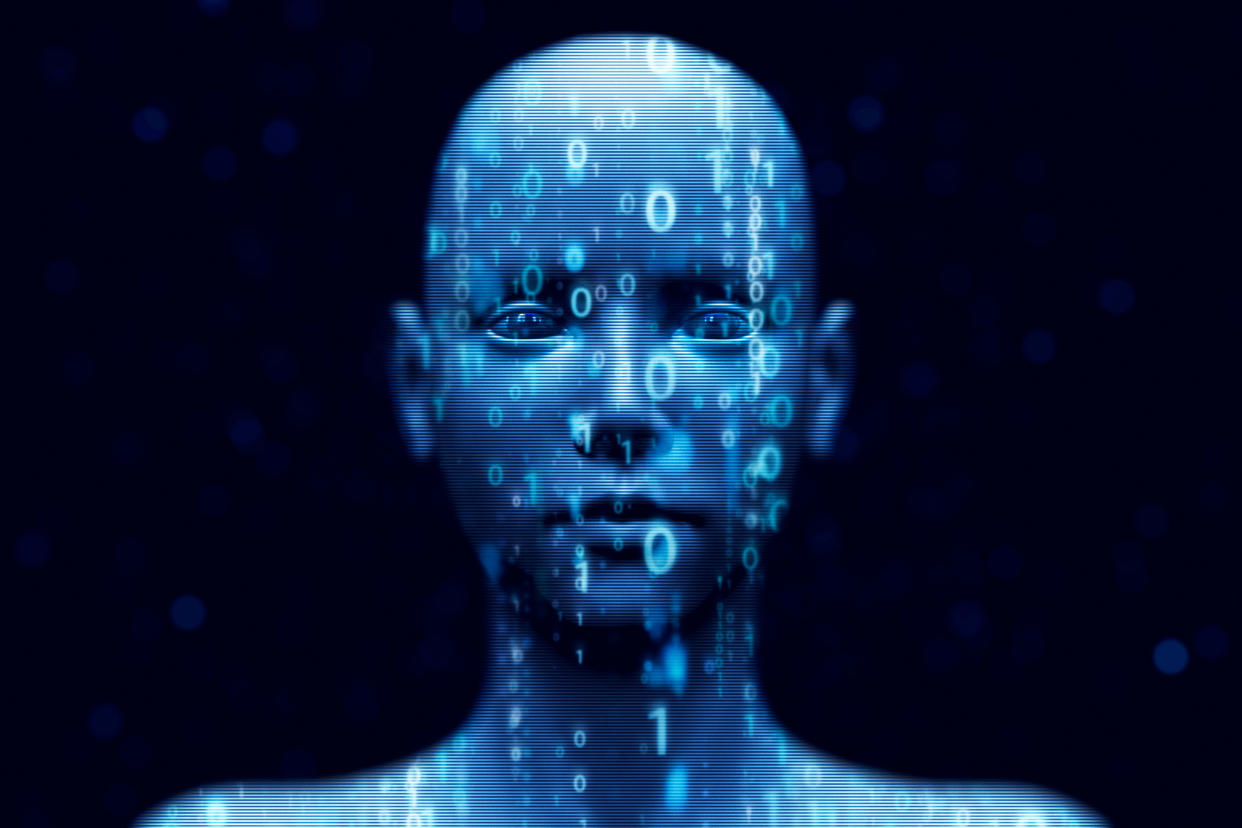The jobs most likely to be affected by AI, according to five experts

Could eight million jobs really be lost in the UK in the very near future due to artificial intelligence?
A worrying report from the Institute for Public Policy Research (IPPR) suggested that there are two ‘waves’ of generative AI adoption, and in the second wave, 59% of tasks done by workers could be automated.
Yahoo News spoke to some of Britain’s leading AI and workplace experts to get an insight into what roles could be automated in the near and mid-term future.
‘Call centres will be fully automated in five years’
Government will need to re-think education, economic, social security and tax systems due to widespread AI-sparked job losses in the next decade, says former Dragons’ Den investor, Piers Linney, founder of Implement AI.
Linney told Yahoo News: "Generative AI will increase productivity as human workforces are augmented and technology becomes more capable over time to take on tasks. This means that fewer employees will be needed. For example, call centres will be almost entirely automated within five years.

Soon, "knowledge workers" such as lawyers, editors or accountants will be affected, Linney believes.
Linney, AI and tech lead at Champions (UK) plc says: "It is a mistake to assume that only low-skilled workers will be affected as a reduction in the need for expensive knowledge workers represents a significant cost-saving. The UK needs to develop a national strategy to ensure the nation remains competitive whilst those with skills that are no longer required are re-skilled."
Accountancy, copywriting and reports
Many of the things AI will automate include ‘jobs within jobs’ – which many people will likely be happy to see the back of, says Dr Clare Walsh, director of education at the Institute of Analytics.
Walsh says: "These are things like preparing the same report from the same data every month which tend to get done by working overtime or at weekends, and can be especially disruptive in months like December, or when people want to take holidays. Many people are happy with that repetitive role being taken away."
But Walsh says that jobs such as copywriting, customer services and accountancy could see a big impact.
Walsh says: "Routine authoring and copywriting – such as creating social media posts and even learning content – will be a common target for AI replacement, too, which includes authoring computer code. We will still need truly creative work and people able to edit the content, so we may see a shift in roles rather than a complete replacement.
"Customer service work is also under threat as theoretically a machine can produce answers to customer enquiries in a polite and efficient way. However, we will need to wait and see how many companies replace their humans.
"These generative AI machines that sound so convincingly human are prone to lying and making up rules that don’t exist and recent judgements suggest that when the machine lies, the company is liable to stand by what the machine has said."
‘Call centres, education and software first’
“In the short term, AI is likely to replace or assist tasks and jobs in call centres, education, software engineering and - not long after that - those in law, finance and media/marketing amongst many other sectors,” says Ian West, Head of Technology, KPMG UK.
West believes it’s essential that people have access to training to reskill or upskill – or more jobs will be at risk.
At present, just 20% of schoolchildren in the UK use AI in the classroom, according to the GoStudent Future of Education Report.

"West says: “For many decades, technological advances have threatened jobs in a variety of sectors. Sometimes this has created a perception of ‘human versus machine’ in parts of the workforce, rather than considering the benefits of ‘human plus machine’.
In sectors such as farming, manufacturing, logistics etc, technology has assisted roles and eliminated some manual tasks, enabling the workforce to potentially upskill and become more efficient.
‘Admin-heavy white collar jobs will go’
The disruptive impact of generative AI will be felt in admin-heavy white collar jobs, warns Ian Silvera, editor of Tech, Power and Media
Silvera says: "The legal industry is already trialling the technology to write formulaic papers, potentially making some paralegal work obsolete. In addition, journalism and the communication industries are using generative AI tools to create more content. Jobs like fact-checking, junior reporters and copywriters could also be at risk because of the technology.
"Consultancy work, which relies on specialised inside information, could also come at risk since generative AI tools make data and information more accessible."
What happens next is most interesting, says Silvera. "You could see a ‘flight to quality’, where businesses and consumers increasingly embrace human-generated goods and services of a higher standard, while others may want to use generative AI for what they deem to be quick and easy tasks."
‘Repetitive, skill-free jobs will go’
People who are worried about their jobs should remember that current AI is ‘narrow AI’ which is actually quite limited, says Dr Chris Pedder, chief data scientist at AI-powered adaptive learning platform Obrizum.
Pedder says: "Right now, any job that can be done repetitively, predictably and quickly without a great degree of skills is probably somewhat at risk. However, there are reassuringly few of these jobs in the modern age. The key aspect that we need to address with the new wave of automation is education, which is key for two reasons.
"Firstly, people will need to learn how to use these new tools, and to navigate the minefields of their potential downsides (hallucinations, toxic content, potential misinformation campaigns), which will be quick to morph and change. Secondly, we need to support people to do the orchestration work that will be much, much slower to be automated."
Read more
ChatGPT is easy to fool – and might be less useful than we thought(Yahoo News UK)
AI researcher calls for 'immediate worldwide ban' (Business Insider)
AI researcher says '10-20%' chance AI will take over (Fortune)


